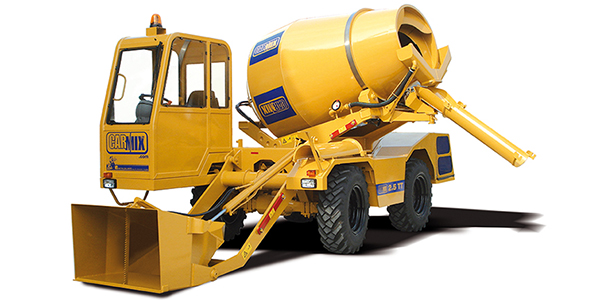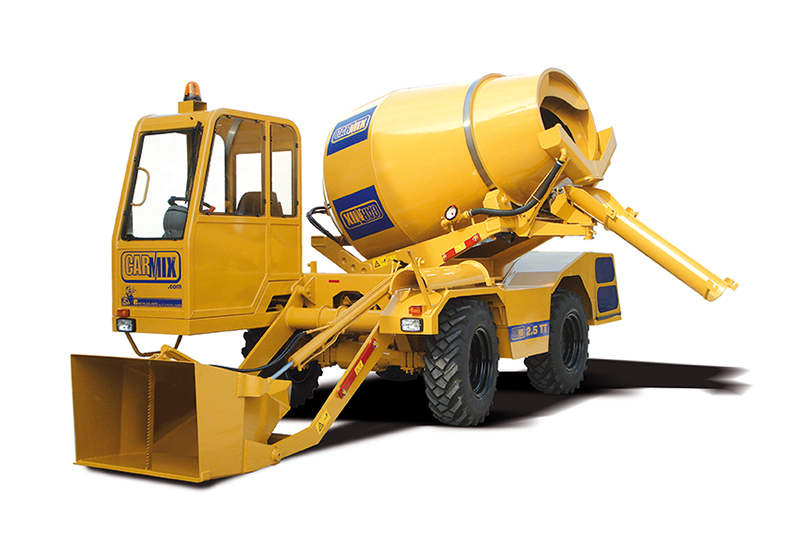
In the construction industry, various types of equipment are utilized to mix, transport, and deliver concrete to job sites. Among the most commonly used machines are transit mixers and concrete mixers. While both are designed to handle concrete production and delivery, there are key differences between the two that impact their functionality, application, and efficiency. Understanding these differences can help construction companies make informed decisions when choosing the right equipment for their projects.
Concrete is the foundation of virtually every construction project, from large infrastructure developments to small residential structures. To ensure high-quality and consistent concrete for these projects, concrete mixer machines have become essential tools on construction sites. These machines are designed to blend cement, sand, gravel, and water into a uniform mixture that can be used to create strong and durable concrete structures. With their efficiency and precision, concrete mixers have revolutionized the way concrete is produced, making them indispensable for both large-scale construction projects and smaller works.
What is a Concrete Mixer Machine?
A concrete mixer machine is a device that combines all the raw materials needed to create concrete into a homogenous mixture. The machine ensures that the materials are mixed thoroughly and consistently to produce high-quality concrete, which is critical for the durability and structural integrity of any construction project.
Concrete mixer machines come in different types and sizes to cater to the varying needs of construction projects. Some are stationary mixers used for large-scale industrial projects, while others are portable and mobile, ideal for smaller or more specific construction needs. In some cases, modern concrete mixers come with self-loading capabilities, allowing for easy handling and transportation of materials directly at the job site.

Key Features of Concrete Mixer Machines for Construction
Concrete mixer machines are equipped with several advanced features that make them suitable for a wide range of construction projects. Here are some key features that highlight the capabilities of modern concrete mixers:
1.Efficient Mixing Drum
The mixing drum is the heart of the concrete mixer machine. It is designed to rotate and mix raw materials—such as cement, aggregates, and water—into a smooth, uniform blend. The efficiency of the drum ensures that the concrete mixture has the right consistency and is free from any lumps or air pockets, which is crucial for the strength of the final product. Modern concrete mixers often have a double helical drum design that enhances the mixing process by evenly distributing the materials inside the drum.
2.Hydraulic System for Easy Loading and Discharge
Many concrete mixer machines come with hydraulic systems that simplify the process of loading raw materials into the mixing drum and discharging the final concrete mix. These systems ensure smooth, controlled movement of materials, reducing the chances of spillage or wastage. Additionally, some machines feature an adjustable discharge chute that allows the operator to direct the concrete flow accurately to the desired location.
3.Portable and Mobile Designs
Concrete mixer machines are available in portable and mobile designs, making them suitable for use in a variety of construction environments. Portable mixers are ideal for smaller projects such as residential driveways or pathways, while self-loading mobile mixers are perfect for larger sites where materials need to be mixed and delivered on the go. The mobility of these machines allows for greater flexibility, especially in remote or difficult-to-access locations.
4.Self-Loading Capabilities
Self-loading concrete mixers are equipped with an automated system that allows them to scoop up and load raw materials directly into the mixing drum. This eliminates the need for additional equipment, such as front-end loaders, and significantly reduces the labor required to operate the machine. Self-loading mixers are especially useful for medium to large-scale construction projects where time and labor efficiency are critical.
5.Electronic Weighing System for Accuracy
To ensure the correct proportions of raw materials in the mix, many modern concrete mixers feature an electronic weighing system. This system provides real-time feedback on the weight of materials being loaded, ensuring that the mix adheres to the specified design ratios. This precision is key to producing high-quality concrete that meets the structural requirements of a project.
6.Built-in Washing System
Concrete mixers often come with a built-in washing system that simplifies the cleaning process after each batch of concrete is mixed. This system helps prevent leftover materials from hardening inside the drum, which could affect the quality of future batches. Regular cleaning ensures the machine operates efficiently and prolongs its lifespan, making it a valuable investment for construction companies.
Types of Concrete Mixers for Construction
There are several types of concrete mixer machines available, each suited to different construction needs:
1.Batch Concrete Mixers
Batch concrete mixers are used to produce concrete in specific quantities or batches. These machines allow for greater control over the mix ratios and are ideal for projects that require precise amounts of concrete. Batch mixers are commonly used for medium to large construction projects and can be stationary or mobile, depending on the job site.
2.Continuous Mixers
In contrast to batch mixers, continuous mixers are designed to produce concrete continuously over a long period. These machines are typically used for large-scale infrastructure projects, such as roads or highways, where a constant supply of concrete is required. Continuous mixers help ensure that the concrete supply is uninterrupted, which is vital for maintaining project timelines.
3.Self-Loading Mixers
As mentioned earlier, self-loading concrete mixers are versatile machines that handle all aspects of concrete production, including loading, mixing, transporting, and discharging. These machines are highly mobile and are perfect for projects in remote locations where access to raw materials may be limited. Self-loading mixers combine convenience and efficiency, making them a popular choice for construction companies.
4.Portable Mixers
Portable concrete mixers are smaller, lightweight machines designed for easy transport and use on smaller job sites. They are ideal for residential projects or small-scale commercial works where concrete is required in smaller quantities. Portable mixers are easy to operate and provide quick, efficient mixing of materials.
Benefits of Using Concrete Mixer Machines for Construction
The use of concrete mixer machines offers numerous advantages, making them a vital tool in the construction industry:
1.Enhanced Efficiency
Concrete mixer machines streamline the entire process of concrete production. With automated systems for loading, mixing, and discharging, these machines reduce the time and labor required to produce high-quality concrete. This increased efficiency allows construction companies to meet project deadlines and improve overall productivity on-site.
2.Consistent Concrete Quality
Concrete mixer machines ensure that the mix ratios are accurate and that the materials are blended uniformly. This consistency results in high-quality concrete that meets the structural requirements of any project. With features such as electronic weighing systems and advanced mixing drums, modern mixers deliver precise and reliable concrete every time.
3.Reduced Labor Costs
By automating much of the mixing and handling process, concrete mixers reduce the need for manual labor on-site. Features like self-loading capabilities and hydraulic systems minimize the effort required to operate the machine, freeing up workers for other tasks. This not only reduces labor costs but also improves efficiency.
4.Flexibility for Various Projects
Concrete mixer machines are versatile and can be used in a wide range of construction applications, from small residential projects to large commercial and infrastructure developments. Their portability and adaptability make them suitable for remote or challenging locations, ensuring that concrete production can continue without interruptions.
5.Durability and Low Maintenance
Modern concrete mixer machines are built to withstand harsh construction environments. They are durable and require minimal maintenance thanks to features like built-in washing systems and reliable hydraulic components. This durability ensures that construction companies can rely on their mixers for long-term use, making them a cost-effective investment.
Conclusion
The concrete mixer machine has become an essential piece of equipment for construction projects of all sizes. Whether you are building a small residential structure or working on a large infrastructure development, these machines provide the efficiency, consistency, and flexibility needed to produce high-quality concrete. With advancements in technology, concrete mixers are now more versatile, durable, and user-friendly, making them a critical tool for modern construction projects. Investing in a concrete mixer machine not only improves productivity but also ensures that the concrete used in your projects meets the highest standards of quality and durability.
Recent Articles
- Market Growth and Future Trends in Self-Loading Concrete Mixers for the Construction Industry
- How Self-Loading Concrete Mixers Reduce Labour Costs and Increase Productivity?
- Comparing Self-Loading Concrete Mixers vs. Traditional Concrete Mixing Methods
- The Role of Self-Loading Concrete Mixers in Modern Construction
- Self-Loading Concrete Mixer Machines for Infrastructure Development Projects
Copyright © 2025, Apollo Carmix Equipments Private Limited (ACEPL), All rights are reserved.
Web Design & SEO by Webmasterindia

